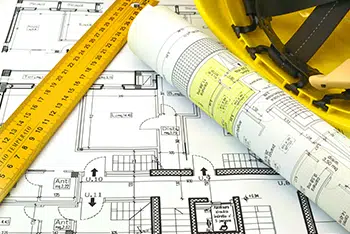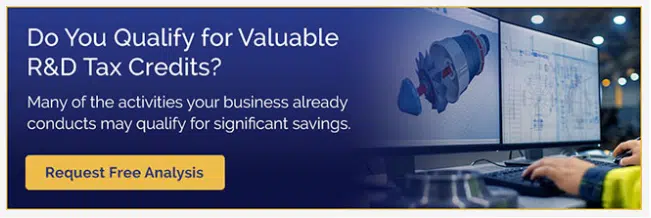Is your engineering firm missing opportunities to capture tax savings? Research and development (R&D) tax credits are a permanent federal tax incentive designed to stimulate innovation, growth and competitiveness. The R&D tax credit – also offered by two-thirds of U.S. states – is one of the most significant domestic tax credits because it serves to maximize a company’s cash flow through tax savings for conducting innovative activities. Yet, businesses in many industries, including engineering, fail to realize that their activities qualify.
Engineering Qualifying Activities for the R&D Tax Credit: One Through Six
Engineering firms with a design-build team and engineers on staff will likely qualify for this valuable incentive through their innovative activities, such as developing new products and designing new concepts.

With that in mind, the following are six qualifying activities for the R&D Tax Credit conducted by engineering firms:
- Determining alternative structural designs
- Managing space to determine the type and scale of facilities
- Improving or determining alternative HVAC systems
- Testing new materials and measuring the characteristics and behavior of such substances
- Designing water and sewage systems in complex environments
- Conducting environmental design/impact studies
Watch our video below for an overview on R&D tax credits.
Four-Part Test for Engineering R&D Tax Credits
A simple four-part test helps to determine which activities constitute qualified research according to criteria established by the IRS:
- Permitted Purpose: The activities must relate to new or improved business components, function, performance, reliability and quality
- Technological in Nature: The activity performed must fundamentally rely on principles of physical or biological science, engineering and computer science
- Elimination of Uncertainty: The activity must be intended to discover information to eliminate uncertainty concerning the capability, method or design for developing or improving a product or process.
- Process of Experimentation: The taxpayer must engage in an evaluative process that is capable of identifying and evaluating more than one alternative to achieve a result. This may include modeling, simulation or a systematic trial and error methodology.
R&D Tax Credit Study
Claiming R&D tax credits calls for a fair amount of documentation required by the IRS. That’s why it’s important to seek professional help from a consultant with a strong expertise in helping engineers successfully claim these valuable tax credits. Engineered Tax Services can conduct a tax credit study to provide a comprehensive analysis of your business’ R&D activities. With this analysis, we can prepare a detailed claim package of expenses that qualify for R&D tax credits, and our professional tax experts will document your activities and expenditures.
There is a direct correlation between the amount of your defensible credit and the expertise of the advisor performing the tax credit study.
Less than one-third of eligible companies realize they qualify for the R&D tax credit.
Now that you have a better idea of qualifying activities and the four-part test, don’t miss the opportunity to minimize your tax liabilities so that you can reinvest in your engineering business.
To learn more about qualifying for R&D tax credits for your engineering activities, visit our R&D tax credit page for more information and complete the form at the bottom of this page. If you have immediate questions about tax deductions for your business, please call Engineered Tax Services at (800) 236-6519.




